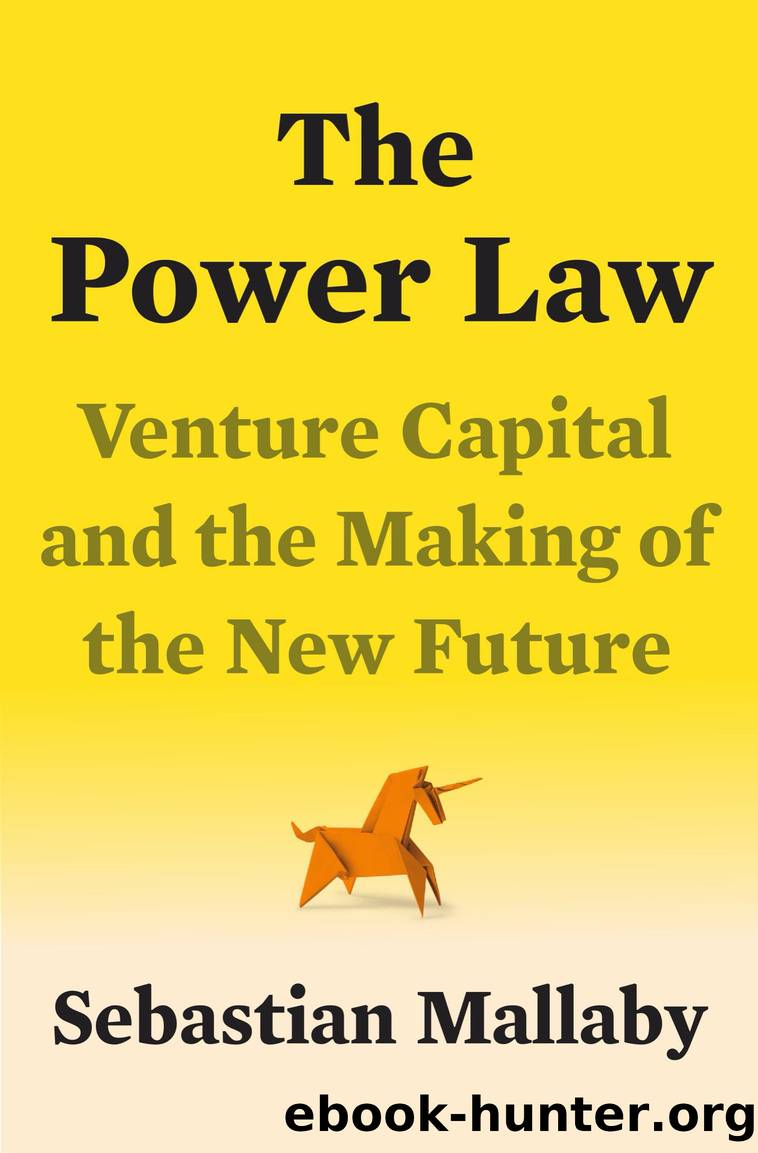The Power Law by Sebastian Mallaby

Author:Sebastian Mallaby [Mallaby, Sebastian]
Language: eng
Format: epub
Publisher: Penguin Publishing Group
Published: 2022-01-25T00:00:00+00:00
The creation of Tigerâs private fund marked the arrival of a new kind of technology investment vehicle. Like many innovations, it was improvised rather than planned. âThere was no whiteboard discussion about âHey, letâs be private-equity investors,ââ Coleman said later.[27] But by moving sideways from hedge-fund stock picking into private technology bets, Tiger had created the template for Milnerâs later Facebook investment. The Tiger tool kit featured the global tabulation of tech business segments, the modeling of earnings and fair value, and rapid intercontinental opportunism in response to a shockâin Tigerâs case, SARS; in Milnerâs case, the collapse of Lehman Brothers. Yet in order for Milner to learn from Tigerâs template, he had to know of its existence.
At the end of 2003, around the time that Ctrip went public, Shleifer flew to Moscow. He was looking, again, for âthe this of the thatâ: he had heard that Russia had two Yahoos and a Google. His first meeting took place at a bar on the roof of a hotel. His host had a quiet, unassuming style. His name was Yuri Milner.
To Shleiferâs amazement, Milner thought the way he did. The son of a Soviet management professor who specialized in American business, he had been the first Russian to study at Wharton, and he was romantically pro-capitalist. The 1980s takeover artistsâHenry Kravis, Ronald Perelman, Michael Milkenâwere among his heroes.[28] After returning to Russia and losing his banking job in the financial crisis of 1998, Milner had read a pile of investment bank studies, seeking career inspiration. Among them was an internet report by Mary Meeker, then Morgan Stanleyâs star tech analyst. At the time, nobody in Russia was talking about the internet, and Milner himself did not even use email. But Meeker laid out how internet penetration was spreading everywhere and how certain online business models would catch the wave, like exquisitely designed surfboards. As Milner said later, this was âa revelation.â
Meekerâs favorite companies were Amazon, Yahoo, and eBay, so Milner resolved to choose one of them and launch a Russian clone. Then he decided, âYou know what, what the heck? Letâs start all three!â[29]
At the time he met Shleifer, in 2003, Milner had abandoned his attempt at cloning Amazon, and his eBay project had gone sideways. But his version of Yahoo, called Mail, was thriving, and he had assembled a variety of investment stakes in other internet properties. Now he gave Shleifer the lay of the land. Based on analysis of how Yahoo clones had generated revenues elsewhere, Mail would soon be worth $1 billion. A rival named Rambler would be worth another $1 billion. The Russian Google, called Yandex, would be worth $2 billion.
Over the first half of 2004, Tiger duly invested in Mail, Rambler, and Yandex. The following year, even as Shleifer began chasing âthe this of the thatâ in Latin America, the relationship with Milner deepened. Tiger became the first institutional backer of Milnerâs investment vehicle, Digital Sky Technologies. Through Milner, Tiger gained exposure to other Russian internet stocks, including VKontakte, the clone of Facebook.
Download
This site does not store any files on its server. We only index and link to content provided by other sites. Please contact the content providers to delete copyright contents if any and email us, we'll remove relevant links or contents immediately.
Zero to IPO: Over $1 Trillion of Actionable Advice from the World's Most Successful Entrepreneurs by Frederic Kerrest(4569)
Machine Learning at Scale with H2O by Gregory Keys | David Whiting(4313)
Never by Ken Follett(3957)
Harry Potter and the Goblet Of Fire by J.K. Rowling(3857)
Ogilvy on Advertising by David Ogilvy(3622)
Shadow of Night by Deborah Harkness(3368)
The Man Who Died Twice by Richard Osman(3079)
Book of Life by Deborah Harkness(2939)
The Tipping Point by Malcolm Gladwell(2922)
Will by Will Smith(2920)
Purple Hibiscus by Chimamanda Ngozi Adichie(2854)
0041152001443424520 .pdf by Unknown(2846)
My Brilliant Friend by Elena Ferrante(2831)
How Proust Can Change Your Life by Alain De Botton(2814)
How to Pay Zero Taxes, 2018 by Jeff A. Schnepper(2655)
Hooked: A Dark, Contemporary Romance (Never After Series) by Emily McIntire(2554)
Rationality by Steven Pinker(2364)
Can't Hurt Me: Master Your Mind and Defy the Odds - Clean Edition by David Goggins(2341)
Borders by unknow(2315)
